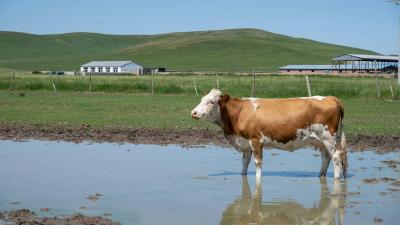Methane From 15 Meat, Dairy Producers Nearly as Much as EU’s Total Methane Emissions

The methane emissions of five of the largest meat corporations and 10 of the largest dairy corporations is equal to over 80% of the European Union’s entire methane footprint, according to a new report.
The report, from the Institute for Agriculture and Trade Policy and the Changing Markets Foundation, also estimates that the combined methane emissions of these 15 companies—which include JBS, Tyson, and the Dairy Farmers of America—exceed the methane footprint of countries including Russia, Canada, Australia, and Germany.
Methane from the meat and dairy industry is produced from manure and the digestion process of animals such as cows, sheep, and goats. Experts say that cutting emissions from methane, which is relatively short-lived but has around 80 times more warming potential than carbon dioxide, is critical in preventing catastrophic climate change.
The report says that individual companies’ methane emissions are also comparable to countries’ livestock-related methane emissions. Methane emissions from JBS—the world’s largest meat processor—exceed the combined livestock methane emissions of France, Germany, Canada, and New Zealand or compare to 55% of U.S. livestock methane. The Dairy Farmers of America, the company that contributes the most methane from dairy, produces emissions comparable to the UK’s livestock emissions.
The overall greenhouse gas emissions—including CO2—from the 15 companies exceed those of oil companies such as ExxonMobil, BP, and Shell.
According to Climate Change 2022: Mitigation of Climate Change, a report from the United Nations’ Intergovernmental Panel on Climate Change, shifting diets from meat and other animal products to plant-based diets has a high potential for reducing carbon footprints and mitigating climate change, as well as improving human health.
The authors of Climate Change 2022 say that studies demonstrate that a shift to plant-based diets rich in pulses, nuts, fruits, and vegetables could lead to substantial reduction of greenhouse gas emissions as compared to current dietary patterns in most industrialized countries. The report says that other co-benefits include lowering the risk of cardiovascular disease, type 2 diabetes, and reducing mortality from diet-related noncommunicable diseases.
To learn more about the benefits of a plant-based diet for the planet and human health, visit PCRM.org/ClimateChange.








